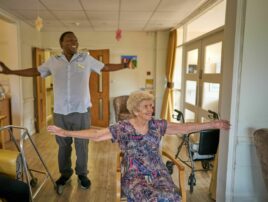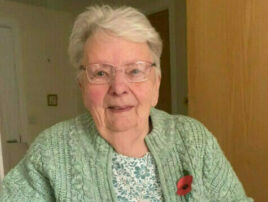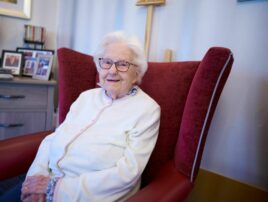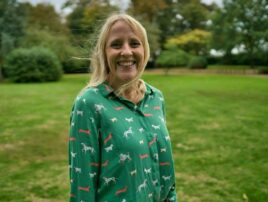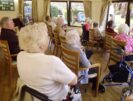Friday 30th May 2025
War stories
With the 80th anniversaries of VE Day and VJ Day this summer, we captured memories from those living with us, the last generation to experience the Second World War
Esther, 95, Milward House, Tunbridge Wells

“I was a schoolgirl, living in Kent, near Tonbridge, right in the country. We had day raids as well as night raids. My father had asked if we wanted to go out of the country but we said ‘no’. We wanted to be together as we were happy as a family and didn’t want to be parted.
“One night, during the Battle of Britain, there was an air raid. We were in bed and they were dropping bombs. A bomb came in through the back of the house, through one of the front bedrooms where I was sleeping, and took out the window. It exploded in the garden path leaving a big crater.
The head of the RAF, chauffeur-driven, came down to see the crater because they hardly believed it. I think this proves beyond doubt that we were protected by God. “We also hosted people in the forces just
before they went abroad. We often wondered if they ever came back. As we were children, they made a fuss of us.
Mary, 94,Middlefields House, Chippenham
“We lived in Highbury, London, where my father was the minister of Highbury Baptist Church. We had a cellar at the bottom of the house where we would shelter during air raids. You would hear a lot of whistling and banging and think, ‘I wonder who’s got that?’ Then you’d go to school the next day and there would be children missing. That often happened.
“My father had a special job reporting fires caused by firebombs, particularly ones in the tops of houses, making sure the fire got put out. On one occasion after a raid he called out, “Come and look at this!” My sister and I went to look and what did we see? A kangaroo hopping along the road! There was an animal enclosure in nearby Clissold Park and a bomb had opened it up and it had escaped.
“On another occasion there was an almighty crash during the afternoon. My father said, ‘I’d better see what’s going on.’ He went to investigate and pushed open the door of a house a couple of doors up from us, where my good friend lived. He couldn’t believe his eyes – the entire rest of the house was gone, leaving only the façade. Wonderfully my friend and her family had had a miraculous escape. They had arranged to move to a safer part of the country and left just the day before.

Gordon, 92, Middlefields House, Chippenham

“I grew up in Stone, near Dartford, in Kent and was an only child. My mother prepared me for evacuation with the tags and all the necessary things. I said, ‘I don’t really want to go’ and she said, ‘Well you’ve got to, it’s too dangerous here.’ She dragged me to the centre and then all of a sudden she pulled my arm hard. I said, “What are you doing?” and she said, “You’re not going”. At that, I was so relieved.
“We lived in a close and everyone decided to give their Anderson shelter to the community to make one big shelter. So they dug a huge pit and fitted all the shelters together so it was like one really long tunnel. They then turfed it so that from the air you wouldn’t think it was a shelter but a mini hill.
“At 6.30pm we were all hauled into the shelter. That’s where we spent the night until about 7am or until dawn came. They had heaters there. People took anything of value down with them, heirlooms or something precious. Sometimes these were shown round because people were proud of them, but normally they kept them to themselves.
“You could hear the bombs whistling down from German bombers. There’d be a whacking great bang and then everything trembled. It was frightening. I remember asking my mum once as she was tucking me into bed ‘what’s it like to die?’. She couldn’t have given a better answer: ‘Not to worry dear, it’s like going to sleep.’ That took the fear out of it, good old Mum.
“I remember once I was in the garden and saw a German fighter with a Spitfire on its tail. My father was shouting his head off, telling me to come in quickly.
“At that time, everyone was very friendly and helpful to each other. If you were walking as a child outside and an air raid siren went, all the doors in the road would nearly automatically open, a head would poke out and say ‘come in, you can’t stand out there’. I’ve had more lunches than I care to remember because people gave.
“After an air raid, I used to go around and gather up shrapnel. I had fins of bombs, pieces of shells, all kinds of what used to be explosive material. I had gathered them all round the fireplace. When the war ended, my father said that when I got home from school my collection would be gone. He said, ‘I’m sorry, I don’t want anything that reminds me of war in my house, it goes out.’ I ran home from school that day and he was true to his word. I thought it was terrible, they were my treasures, but I understand now completely. War is a devil’s device, that’s how I’d describe it. There’s nothing good about it.
To receive your copy of the magazine FREE four times a year, sign up now.
David, 89, Pilgrim Gardens, Leicester
“I lived in Brighton and was four at the start of the Second World War. I had to take a gas mask with me to school as there was a danger the Germans would use mustard gas as they did in the First World War. My brother, who was three years younger than me, had a much larger contraption in which he could be placed, very much like a small cot.
“When the air raid siren went off we had to go into the shelter in the playground which had a typical acrid cement smell. The alarm and all-clear sirens are never forgotten!
“One day in 1941 I went home for lunch and during that time one of my classmates, David Bell, went home for his lunch and was killed, as were eight others, by a direct hit on a nearby row of shops. That was around 200 yards from where we lived and one of our ceilings came down in the bomb blast.
“I used to go to the local park where some Canadian soldiers were under canvas before going, as I subsequently learnt, to D-Day in Normandy. Several in my class used to pester the Canadians for their used Sweet Caporal cigarette packets as there were two aircraft identification cards with each packet. We used to swap them with our classmates.

“Once, I went into our garden in the evening and saw searchlights focussing on a German bomber. I said to my mother that I thought it might be a Heinkel but was promptly picked up by my shirt collar and placed in our Morrison shelter which was in our living room so I never did get to know.
“Two or our neighbours’ boys were evacuated to Yorkshire and when they eventually returned to Brighton after the threat of invasion had lessened they had broad Yorkshire accents!
“We used to travel by paddle boat from Portsmouth to the Isle of
Wight. Shortly after the end of the war, we saw the Queen Elizabeth, in battleship grey, en route with returning American troops waving enthusiastically from every vantage point.
Rob lived at our home Finborough Court, Great Finborough, passing away at the age of 97

“I was born in Dagenham and moved to Barking in 1937. My school was evacuated but I wasn’t – my father said, ‘If we die then we’ll all die together.’
“On 7th September 1940 there was the worst air raid on London. Our house had a cellar where we sheltered if we couldn’t make it down to the Anderson. My mother and brother and I sheltered there and I remember the doors and windows of our house were blown out. Our father came back later – he’d had to walk all the way home from his job as a guard on the railway as there was no transport. He said, ‘I think we’ve lost this one.’ It was dreadful.
“We lived near the Hornchurch Aerodrome, which was a key target. There were daylight raids as well as nighttime ones, they sent so many planes.
“The V1 and then the V2 rockets were a terrible threat. The V2 rockets sounded like a low motorbike. As long as you could hear it, you were okay. When it went silent was when it had gone up into space ready to come back down in flames. You had to duck and hope for the best.
“Once, I saw a Hurricane or a Spitfire up in the sky. A V2 rocket was alongside it. The plane tilted it with his wing and managed to turn it and send it back again. The pilot was very brave.
“Another time, I was walking to school and there was an air raid. I was carrying my gas mask and I felt something hit the tin canister it was contained in. It turned out to be a piece of shrapnel from an anti-aircraft gun. I kept that piece of shrapnel for a long time.”
More great stories from those living with us...

War memories for VE Day
To mark the 80th anniversary, those who live with us across our homes and schemes shared their stories with the media

My Story, Bé
Bé, 93, told us about growing up in Nazi occupied Holland, working as a mother’s help and meeting her husband

My Story: David
As a child, David was evacuated to Berkshire. Now 97, he shares an extract from his memoirs

